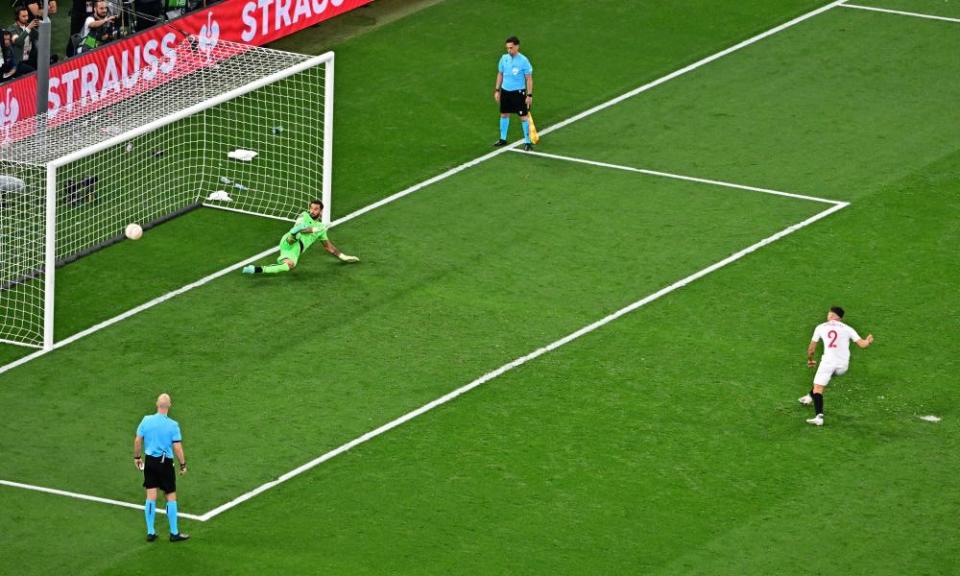José Mourinho fights the bad fight, but ends up on the losing side

José Mourinho, perhaps, is a pleasure better remembered than experienced. We chuckled at him wearing a wire, at him laying into Daniel Levy with the scorn that only he can muster, progressing through a semi-final with an xG of 0.03. Classic José, we said with a smile. Still fighting the bad fight. Still harrumphing and provoking and spoiling. And then you actually watch his Roma play – and, as it turned out, lose. And that is dreadful.
For Roma, no doubt, the ends would have justified the means. Had they won, this would have been their greatest international success and that would have been all that mattered, all that they remembered. Mourinho, after all, is adored by Roma fans to a degree that is disconcerting to those who witnessed his final season at Real Madrid or anything in England after he had won the league with Chelsea in 2015.
Related: Montiel edges Sevilla to seventh Europa League triumph with win over Roma
Grouchiness, not even Mourinho-level high-grade grouchiness, is not enough to stop Sevilla in this competition: since 2006 they have been in seven finals and won them all. Perhaps Europa League Sevilla are simply a force that cannot be halted, but it’s hard not to think that Roma might have had a better chance by playing football than whatever it was to which they brought the game down.
Mourinho wasn’t the first manager to regard the press conference as a field of battle. He wasn’t the first to insist that black was white, to pick fights for some nefarious grander purpose, to cry conspiracy at every setback. It wasn’t he alone who poisoned the discourse, who ensured the vast majority of social media interactions about football would be infected by a one-eyed tribalism. But he certainly didn’t help.
He is a nihilist. Nothing matters for Mourinho but winning, not the game, not the public, not any naïve idea of decency. And so his team and his backroom staff contest every decision. Every time they win a free-kick, they demand further retribution in the form of yellow cards. This season 13 red cards have been shown to members of the Roma bench, whether coaches or substitutes. This is not coincidence; it is a plan, an orchestrated action to pressure referees and tip the balance of decisions. Sevilla were far from innocent, but equally the sense was that their gamesmanship was a reaction to Roma’s.
It’s not fashionable to think of the officials, whose role in modern football seems largely to be as an excuse for losing managers and fans. It would a difficult job anyway, but how much harder when everybody is trying to cheat, all the time. Under which circumstances the referee, Anthony Taylor, the fourth official, Michael Oliver, and even the VAR, Stuart Attwell, performed admirably.
The level of calculation was apparent in the way Roma’s bench suddenly stopped protesting at the start of the eternal extra time, as the focus switched to feigning injury – which led to the fracas that ultimately earned Mourinho the yellow card that had seemed his destiny from the first whistle. The 11 minutes 20 seconds of added time in the second half of extra-time – that is, 75.5% of the whole – again seemed a victory for Taylor’s refusal to accept Roma’s prevarications. Although also a defeat for football.
In total, the final lasted 146 minutes. It felt longer. And yet nobody can feel they got their money’s worth.

It surely didn’t matter, but Taylor and Attwell had the final word, determining Rui Patrício had moved off his line before he saved Gonzalo Montiel’s penalty. The Argentinian had scored the decisive penalty in the World Cup final in December; he didn’t waste his reprieve.
Yet it had all started so well, as Paulo Dybala gave Roma the lead. Dybala had been the subject of a classic Mourinho coup de theatre in Tuesday’s preview press conference. The allotted time for questions had been used up without anybody asking about the Argentinian’s fitness, so as a halt was called, there was a clamour to ask whether Dybala had recovered from his hip injury. Mourinho made as if to leave without answering, then paused at the past before suggesting he might be able to play for “20 minutes”. Which meant one of two things: either he would play no part at all or he would be fit to start. Unless, of course, Mourinho knew we’d think that and he actually was fit for 20 minutes. Unless he knew we’d think that. Whether it was a bluff or a triple bluff, it wasn’t a double bluff, and Dybala not only started but scored the opener, before going off after 63 minutes.
Related: Sevilla beat Roma on penalties to win a seventh Europa League – live
By then the tide had already turned. Roma might have been able to frustrate Bayer Leverkusen in the semi-final, but their retreat into spoiling seemed only to encourage Sevilla, who had hit the post from Ivan Rakitic even before equalising. Not for the first time with Mourinho, the question occurred of whether this had really been the best way of going about things, or whether he had allowed his embrace of the dark side to dictate the approach.
When it was all, finally, done, Mourinho led his players on a lap of honour, pulling slowly further and further away from them, before leaving them behind altogether and trotting up onto the presentation platform for his own private ceremony. He hugged the Uefa president, Aleksandr Ceferin, accepted his medal and walked off, removing his medal and tossing it to a child in the crowd as he made for the tunnel.
In that moment, the person the dark lord most resembled was David Cameron on the morning of his resignation.

 Yahoo Sport
Yahoo Sport 




































































